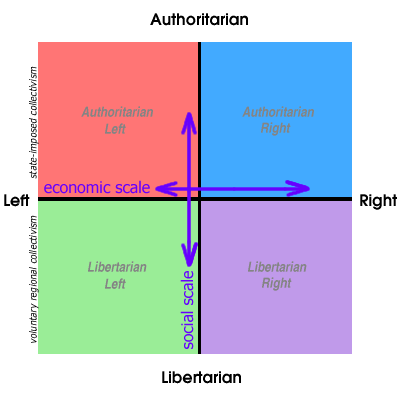Why do I get the feeling that the "Political compass test" is the creation of the Libertarian party?
---------------------------------------------------------------------------
The starting point of the (original) Political Compass was in 2001, when we recognised the inadequacies of the standard political measure:

It’s certainly fine for discussing economics but to this day is still widely — and wrongly — used to describe social attitudes. France’s National Front, for example, is popularly described as “far right”, yet its economic policies have sometimes been to the left of even the French Socialist Party. The party’s real extremism is in its social attitudes. That’s why we added a social scale.

Nevertheless, the more nationalistic and authoritarian a party or individual is, the more ‘right-wing’ they’re still labelled. This, of course, is absurd. Taken to its logical conclusion, it means that the further left a country sits, the more socially liberal its attitudes are. on that basis, North Korea must be a shining model of human rights and social freedoms!
Conversely, a country may be very right wing (ie libertarian) in its economics, and be authoritarian at the same time. Singapore is a perfect example.
The Index of Economic Freedom produced by the Wall Street Journal and the conservative Heritage Foundation, hails Singapore as the economically freest nation on Earth in 2021. On the social scale, however, it’s a very different story. Human Rights Watch details its reasons for finding Singapore a deeply authoritarian state.
Take a look at a few contrasting nations on this chart:
SingaporeSwitzerlandUruguayChinaNorth KoreaSaudi ArabiaAuthoritarianLibertarianLeftRight←economic scale→←social scale→
Uruguay is currently rated the world’s 44 th most free economy, and a leading Latin American light in social freedoms — from gay and lesbian rights to legalisation of cannabis. Switzerland also has a high rating as a libertarian economy, while at the same time providing a wide range of social welfare programmes, in common with the Nordic states and a number of other western countries.
With the exception of its Hong Kong region, China maintains strong economic controls, though fewer than those associated with a more orthodox ruling ‘Communist’ party. In recent years China has shifted closer to the totally repressive social climate of North Korea, where the economy also is under the absolute control of the state. Saudi Arabia has veered futher towards a libertarian economy in recent times, but with no real relaxation of its sweeping authoritarian powers.
How You Can Help Us
A great deal of effort lies behind the development of The Political Compass, and the realisation of it in practical form. It has occasionally come to our attention that other sites have tried to exploit our work by copying it, adopting our name, or linking to us in a dishonest fashion.
https://www.politicalcompass.org/analysis2
















































